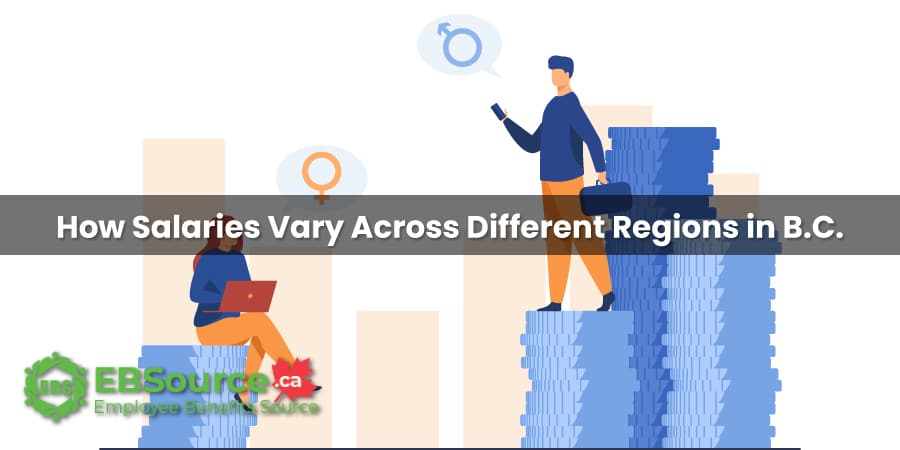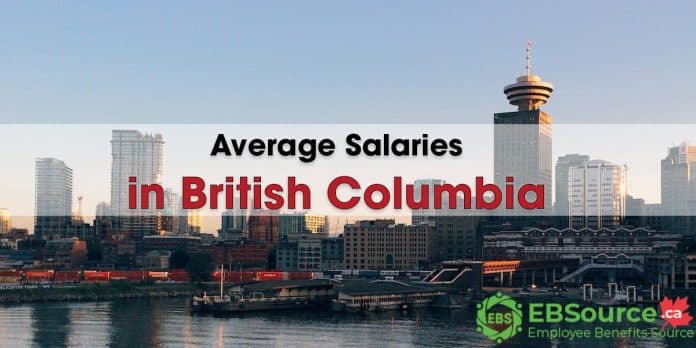Known for stunning scenery and a thriving job market, British Columbia has become a coveted place to live and work in Canada. According to Statistics Canada, average salaries in British Columbia now surpass average salaries in Canada based on hourly earnings, outpacing other provinces for the first time in nearly 20 years.
However, these high provincial wage averages disguise large inequalities across occupations, regions, and income brackets within B.C. At the same time, the cost of living continues to rise, making it harder for many people to afford daily expenses.
What Are The Average Salaries in British Columbia?
The average weekly salary in B.C. as of 2025 is $1,304, which works out to approximately $32.60 per hour and $67,808 per year (40-hour work per week). (Source)
According to VanHack, based on nearly 4,000 reported salaries, entry-level workers earn $54,785 annually, while experienced professionals can reach $150,005 per year.
British Columbia’s High Average Wage Growth
British Columbia has climbed to the top in average wages across Canada, signalling a shift in the country’s economic landscape.
Multiple factors likely contribute to B.C.’s accelerating wage gains compared to other provinces. Most critically, B.C. has implemented steady increases to its minimum wage over recent years.
However, critics argue that the unhealthy expansion of public sector employment has also artificially inflated B.C.’s average.
Since 2019, public sector jobs have ballooned in the province, while private sector growth stagnated. Opposition leaders accuse the government of unsustainable hiring bloat, countering the NDP’s narrative on wage gains.
The truth likely lies somewhere in the middle, with increases in the minimum wage in British Columbia and public job creation supporting broader upward momentum for B.C. wages. Sustaining long-term growth will require consistent growth in well-paying private jobs.
How Salaries Vary Across Different Regions in B.C.

Salaries differ substantially between regions in B.C. North Cowichan leads at $119,449 annually, while smaller communities average between $54,000 and $115,000. These differences are caused by local economic conditions, industry presence, and cost-of-living factors.
Let’s see a table showing 10 Cities and towns with the highest average salaries.
| City | Average Annual Salary |
| North Cowichan | $119,449 |
| Duncan | $118,989 |
| Oak Bay | $118,773 |
| Victoria | $118,270 |
| Courtenay | $116,851 |
| Kelowna | $115,839 |
| West Kelowna | $115,818 |
| Dawson Creek | $114,832 |
| Chilliwack | $114,525 |
| Campbell River | $114,446 |
While provincial wage averages are rising, a wide range exists across income levels in B.C. North Cowichan tops the list with average annual salaries of $119,449, followed by Duncan ($118,989) and Oak Bay ($118,773). Victoria, the provincial capital, averages $118,270 annually, benefiting from substantial government employment.
Small towns and rural areas generally have lower average wages than major cities but correspondingly lower costs of living. For example, Princeton ($56,074) and Chase ($54,785) highlight the importance of considering total compensation value rather than nominal wages alone.
Source: Average Salary in British Columbia – VanHack
Jobs Receive Highest Average Salaries in British Columbia

Unsurprisingly, the top salaries in B.C. are earned primarily by medical specialists. Orthopedic surgeons top the list with an average annual salary of $379,281. They are followed closely by interventional cardiologists, who earn an average of $370,666 per year.
Their advanced medical training enables these professionals to command Canada’s highest pay scales. See the table below for the Top 10 Highest Paying Jobs in B.C.
| Occupation | Average Annual Salary |
| Orthopedic Surgeon | $379,281 |
| Interventional Cardiologist | $370,666 |
| Vascular Surgeon | $364,999 |
| Diagnostic Radiologist | $362,500 |
| Interventional Pain Physician | $360,714 |
| Gastroenterologist | $358,609 |
| Anesthesiologist | $354,889 |
| Hematologist Oncologist | $352,572 |
| Urologist | $350,913 |
| Locum Anesthesiologist | $348,287 |
Source: Average Salary in British Columbia – ziprecruiter.com
Beyond that, technology roles have also had high income in recent years. IT managers and software architects are paid from $160,000 to $220,000 annually. To reach that level, they need both technical expertise and leadership skills.
Additionally, data scientists and AI engineers command between $140,000 and $190,000 yearly. These positions require specialized knowledge in machine learning and artificial intelligence.
How Living Wages Vary Across Different Regions in B.C.
When people think about the high cost of living in B.C., Vancouver usually comes to mind.
But other areas also report living wages significantly above minimum wage, and this shows just how challenging it can be for families to keep up. The living wage is just about earning enough to afford basic needs like housing, food, transportation, and child care—not about luxury.
You can see the numbers highlighted below in the table to understand what it actually takes for people in the province to live comfortably.
Living Wages in Select B.C. Communities
| Community | Hourly Living Wage |
| Victoria | $26.78 |
| Kelowna | $25.77 |
| Golden | $26.96 |
| Kamloops | $23.69 |
| Prince George | $22.93 |
| Nanaimo | $23.79 |
| Whistler | $28.09 |
Even in more affordable cities like Kamloops and Prince George, living wages exceed $20 per hour, underscoring the challenges of making ends meet on minimum or low wages.
Source: Living Wages in BC and Canada – livingwagebc.ca
Impact of Average Salaries in British Columbia on Workers

British Columbia has a retention problem, and it’s rooted in pay. Inter-provincial and international income disparities have detrimental impacts on B.C. workers from a competitiveness and talent retention perspective.
With lower wages on offer, B.C. cities will struggle to attract qualified professionals, especially in high-demand fields like technology.
Vancouver’s tech talent is already being poached by firms south of the border that can pay substantially higher salaries.
Younger workers, in particular, show a willingness to relocate for higher incomes and greater affordability. They are moving to places where their income goes further and their financial future feels more secure. If B.C. is to avoid a long-term brain drain, we must make it financially viable for our best and brightest to build their lives here.
Average Salaries in Canada vary widely between provinces and territories due to factors like cost of living, labour supply, and economic strength. To help you understand pay scales across Canada, we’ve compiled this series on average salaries by region:
- Average Salaries in Nunavut
- Average Salaries in Nova Scotia
- Average Salaries in Quebec
- Average Salaries in Ontario
- Average Salaries in Yukon
- Average Salaries in Manitoba
- Average Salaries in Saskatchewan
- Average Salaries in Alberta
Key takeaways
The strong growth of average salaries in British Columbia seems promising on the surface. However, looking closer shows ongoing problems, like inequality, geographic disparities, inflation erosion, and living wage gaps that hinder inclusivity. Understanding these patterns through reliable government and industry sources helps workers to make good career decisions in BC.
FAQs about average salaries in British Columbia
How does location impact salary in BC?
Location has a major impact on salaries in BC. Major urban centers like Vancouver and Victoria generally have the highest average wages, while smaller towns and rural areas lag behind. Cost of living and job concentration impact pay.
What sectors offer the best salary growth potential in British Columbia?
Sectors like technology, engineering, finance, healthcare, and skilled trades tend to see above-average salary growth in BC due to high demand. Public administration salaries also rose with recent hiring. Resource-based industries can be cyclical.
What benefits and perks commonly come with higher paying jobs in BC?
Higher salaries in BC often come with additional benefits like generous vacation/time off, professional development stipends, health/dental coverage, retirement matching, car allowances, and flexibility.
What is the salary distribution like between urban and rural areas of BC?
Salaries tend to be higher in major metros, while smaller communities have lower nominal wages. However, real purchasing power may be higher in less populated areas with lower costs of living.
How competitive are professional salaries in BC compared to other provinces?
Professionals in BC tend to earn less than counterparts in Alberta but have mostly surpassed Ontario counterparts. Compared to U.S. states, BC salaries lag for roles like engineers and tech workers.
How much does specific experience impact expected salaries in BC?
More specialized experience/seniority can significantly boost salaries - potentially $20K-$40K+ between entry-level and expert roles in fields like tech, business, healthcare, etc.
Outside of occupation, what other factors influence earning potential in British Columbia?
Education level, employer size/type, specific skills, years of experience, certifications, networking, negotiation skills, and location all impact potential salary ranges.

